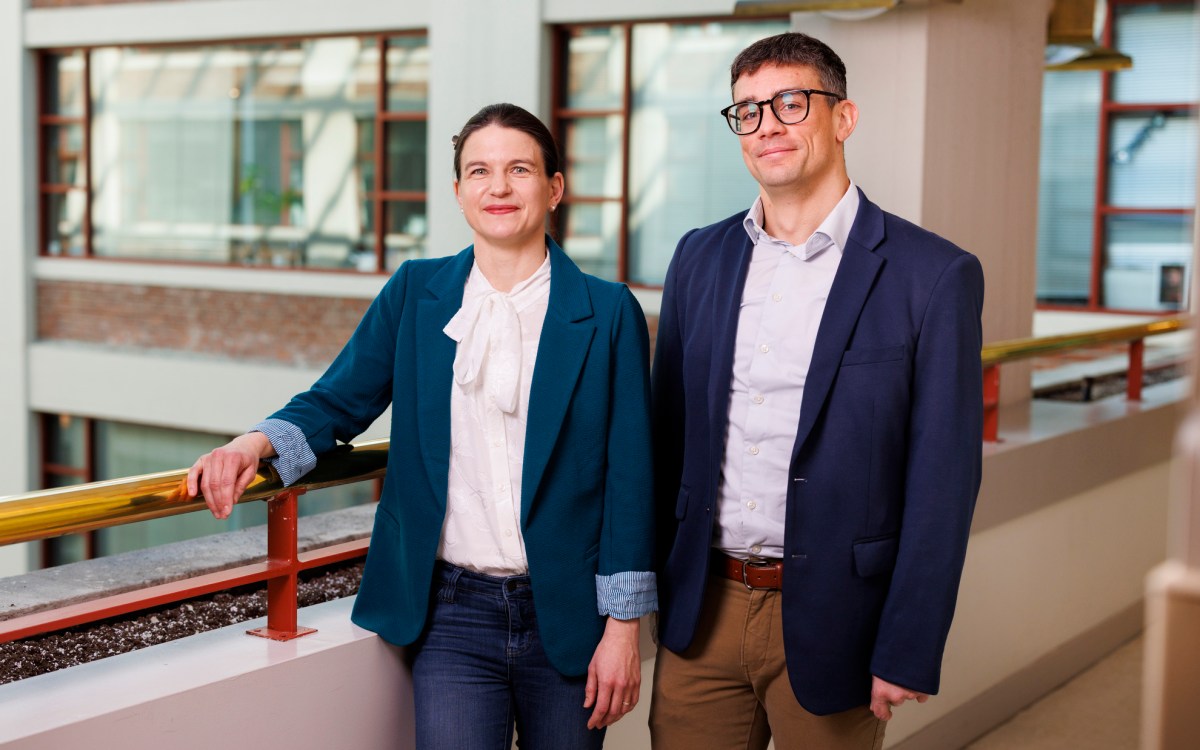Health
-

Which is worse, a soda or a beer?
Experts seek to clarify the health effects of alcohol and sugary drinks
-

‘I think I know how to fix this.’
How a discovery in a Harvard lab is offering hope for patients with hard-to-treat heart disease

-

American heart health worsening
New statistical snapshot finds disappointing trend despite advances in treatment, ways to prevent nation’s leading cause of death

-

Tracking mysteries of loss of Y chromosome, cancer
Research suggests it may explain higher incidence, severity of some disease in men
-

How realistic is ‘The Pitt’?
Doctors weigh in on what hit TV show gets right and wrong about life in the ER — from pacing and caseloads to workplace culture (and that waiting room from hell)
-

Yoga can help cut severe, initial opioid-withdrawal period in half, study finds
Researchers say results could dramatically increase chances of recovery
-
Study shows new compound may reduce risk of vision loss in patients with diabetes
The PKC-Diabetic Retinopathy Study (DRS) was designed to evaluate the safety and effect of an oral treatment, RBX, on retinopathy progression or visual loss in patients with moderately severe to…
-
Blood vessel drugs halt cancer growth
After decades of surviving peer rejection of his theory of cancer treatment by blocking tiny blood vessels, Judah Folkman has gone on to develop drugs that did what he predicted…
-
Size of brain structure could signal vulnerability to anxiety disorders
Individuals respond with physical and emotional distress to situations that recall traumatic memories. Such responses usually diminish gradually, as those situations are repeated without unpleasant occurrences; this is called “extinction…
-
Women’s health study: Long-awaited findings of low-dose aspirin and vitamin E in preventing disease
The WHS trial was led by BWH researchers Nancy Cook, Sc.D., and Julie Buring, Sc.D. Its results are published in the July 6, 2005 Journal of the American Medical Association.…
-
Scientists identify normal gene driving the growth and survival of melanoma cells
Dana-Farber’s Levi Garraway, M.D., Ph.D., and William Sellers, M.D., the paper’s first and senior authors, and their colleagues reported their findings in the July 7, 2005 issue of the journal…
-
Urine test may help monitor disfiguring birthmarks
Vascular anomalies include both vascular malformations and vascular tumors (most commonly hemangiomas). Hemangiomas, found in about 10 percent of infants, occur when the cells lining blood vessels multiply abnormally. Hemangiomas…
-
Child early intervention programs make for healthier adults
The Brookline Early Education Program (BEEP), a community- based child health and development program, was initiated by the Brookline Public Schools and the Robert Wood Johnson Foundation and ran from…
-
DNA-scanning technology finds possible sites of cancer genes in chromosomes of lung cancer cell
In a study in the July 1, 2005 issue of the journal Cancer Research, the researchers used single nucleotide polymorphism (SNP) array technology to identify regions of chromosomes where genes…
-
Higher levels of systemic inflammatory markers associated with progression of AMD
Researchers led by Johanna M. Seddon, M.D., at the Massachusetts Eye and Ear Infirmary, Harvard Medical School, and Harvard School of Public Health, conducted a prospective longitudinal study to examine…
-
Disease mutation tracked down, ending ‘curse’ for Colombian families
Three years later, Joseph Arboleda-Velasquez, an HMS graduate student who led the scientific team that identified the mutations, and his collaborators have worked out an early step in the events…
-
Gene clue to brain asymmetry revealed on right side
Although many assumed that the asymmetry-producing genes, when found, would be more highly expressed on the left side of the brain than the right, Sun Tao, Christopher A. Walsh, and…
-
Fetal-cell transplants reverse Parkinson’s in two patients
The two patients were part of a small exploratory study in Halifax. In the study, the cells were bathed in the trophic factor GDNF before being implanted into the striatum,…
-
Studies chip away at sex hormone roles in prostate and breast cancers
In recent work, Myles Brown and colleagues combined chromatin immunoprecipitation (ChiP) assays with measures of DNA structure and large-scale gene chip analyses to study where, when, and how androgen and…
-
Novel combination overcomes drug-resistant multiple myeloma cells
The researchers hope to move rapidly to clinical trials of the therapy, a combination of the drug Velcade and an experimental compound that was designed by researchers at the Broad…
-
CT significantly reduces the need for appendectomy
For the study, the researchers analyzed 663 patients who were examined on CT for suspected appendicitis. An appendectomy was performed on 268 of the CT-screened patients. Of these 268 patients,…
-
‘Brown fat’ cells hold clues for possible obesity treatments
In laboratory studies of mouse cells, the research team identified genes that govern how precursor cells give rise to mature brown fat cells. There are two main types of fat…
-
Exercise shown to promote breast cancer survival
Exercise plays a role in preventing breast cancer, and research strongly suggests that breast cancer patients who are more physically active improve their self-esteem and body image. Now, a landmark study from the Brigham and Women’s Hospital (BWH) finds that exercise after diagnosis may help breast cancer patients live longer.
-
Imaging may not be major driver of hospital cost increases
“There have been several news stories and reports from insurers claiming that imaging costs are catching and even surpassing drug costs as major drivers of health care inflation,” says Scott…
-
Magnetic stimulation may improve stroke recovery
Repetitive transcranial magnetic stimulation treatment improved motor function in a small group of people. For the stimulation, an insulated wire coil is placed on the scalp, and an electrical current…
-
TB gene identified
As many as one out of three people in the world are infected with the bacteria that causes tuberculosis, public health experts estimate. That could lead to a global plague…
-
Broken hearts may mend after all
Although adult muscle cells become inflexible after differentiation, these cells temporarily loosen the structure to divide in fetal development. Mark T. Keating found that in some lower vertebrates, heart tissue…
-
Breathing restored after severe spinal-cord injury
Keeping an animal functioning after a cervical spinal cord injury is nearly impossible. An American researcher developed the lower spinal cord rat model in the early 1900s. He found that…
-
Insulin prods development of type 1 diabetes
Joslin Diabetes Center researchers Diane Mathis’s and Christophe Benoist’s finding that the lymph node draining the pancreas was intrinsic to the autoimmune response in mice made David Hafler, HMS professor…
-
Aspirin use may protect against colon cancer recurrence, reduce risk of death
“Our data are intriguing because they showed that aspirin use notably reduced the risk of recurrence in patients with advanced colon cancer, but more research is needed before any treatment…
-
Drug combination boosts survival rate in head and neck cancers
Previous studies have shown that using combination chemotherapy of cisplatin and 5-fu yields a 25 to 50 percent rate of complete pathological responses (the tumor disappeared). Robert Haddad, M.D., and…
-
Left- or right-brain? Genes may tell the story
According to HHMI investigator Christopher A. Walsh, postdoctoral fellow Tao Sun, and their colleagues at Beth Israel Deaconess Medical Center and Harvard Medical School, their discovery that a gene called…
-
Brain chemical serotonin involved in early embryo patterning
A study published in the May 10, 2005, Current Biology has ramifications for neuroscience, developmental genetics, evolutionary biology and, possibly, human teratology (a branch of pathology and embryology concerned with…
-
Study finds men who consume more dairy products have lower incidence of diabetes
A report from researchers at Massachusetts General Hospital (MGH), Harvard School of Public Health (HSPH) and Brigham and Women’s Hospital (BWH) – the first large-scale, prospective examination of a relationship…
-
Low-fat dairy foods may help reduce risk of type 2 diabetes
“Our study found that men consuming higher levels of dairy products, especially low-fat dairy foods, had a significantly lower risk of developing type 2 diabetes during a 12-year period,” says…
-
T cell misfits may spell autoimmunity
For a would-be T cell, the journey from cradle to grave is likely to be brief. After leaving the bone marrow, the immature immune cell travels directly to the thymus,…

